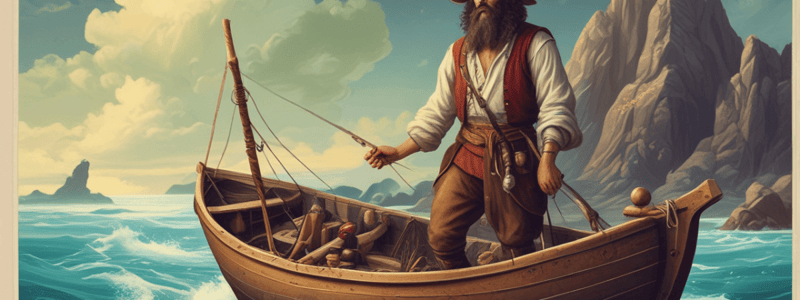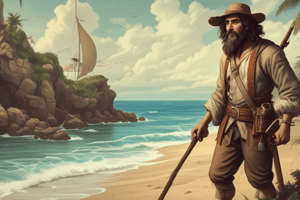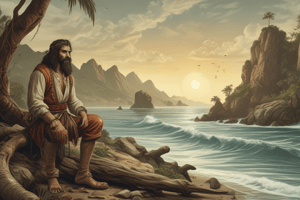Podcast
Questions and Answers
What did the old man say would happen to the narrator if he didn't go back?
What did the old man say would happen to the narrator if he didn't go back?
- He would meet with disasters and disappointments (correct)
- He would be welcomed back with open arms
- He would be rewarded with a fortune
- He would be forgotten by his family
Why did the narrator initially hesitate to go home?
Why did the narrator initially hesitate to go home?
- He was worried about his mother's health
- He was unsure of his father's whereabouts
- He was afraid of his father's anger
- He was ashamed of his mistakes (correct)
What observation did the narrator make about human nature?
What observation did the narrator make about human nature?
- People are generally kind and forgiving
- Everyone is ashamed of their mistakes
- People are not ashamed to sin, but are ashamed to repent (correct)
- Youth are more rational than adults
What did the narrator ultimately decide to do instead of going home?
What did the narrator ultimately decide to do instead of going home?
What was the narrator's great misfortune?
What was the narrator's great misfortune?
Why did the captain take a fancy to the narrator's conversation?
Why did the captain take a fancy to the narrator's conversation?
What was the captain's offer to the narrator?
What was the captain's offer to the narrator?
What did the narrator realize about his choices?
What did the narrator realize about his choices?
What did the narrator think he might meet with on the voyage?
What did the narrator think he might meet with on the voyage?
What did the narrator do with the captain's offer?
What did the narrator do with the captain's offer?
Flashcards
What was Robinson Crusoe's father's profession?
What was Robinson Crusoe's father's profession?
Robinson Crusoe's father was a wise man who wanted his son to pursue a stable life, specifically a career in law, to ensure a secure future.
What did Robinson Crusoe choose to do instead of following his father's advice?
What did Robinson Crusoe choose to do instead of following his father's advice?
Crusoe, despite his father's advice, was drawn to the sea, seeking adventure and a life of exploration.
What event during Crusoe's first voyage left a lasting impression on him?
What event during Crusoe's first voyage left a lasting impression on him?
Crusoe encountered a violent storm during his first voyage, which instilled a deep fear within him.
How did the storm affect Crusoe's aspirations?
How did the storm affect Crusoe's aspirations?
Signup and view all the flashcards
What did Crusoe's father value most in life?
What did Crusoe's father value most in life?
Signup and view all the flashcards
How did Crusoe react to the storm?
How did Crusoe react to the storm?
Signup and view all the flashcards
Who warned Crusoe against pursuing a life at sea?
Who warned Crusoe against pursuing a life at sea?
Signup and view all the flashcards
What was a significant and traumatic event that occurred during the storm?
What was a significant and traumatic event that occurred during the storm?
Signup and view all the flashcards
How did Crusoe find safety after the ship started to sink?
How did Crusoe find safety after the ship started to sink?
Signup and view all the flashcards
What did Crusoe ultimately decide to do after being rescued from the sinking ship?
What did Crusoe ultimately decide to do after being rescued from the sinking ship?
Signup and view all the flashcards
Study Notes
Early Life and Family
- The narrator, Robinson Crusoe, was born in 1632 in York, England, to a good family of foreign origin (his father was from Bremen, Germany).
- His father was a merchant who had settled in Hull and later moved to York, where he married Crusoe's mother, whose family was named Robinson.
- Crusoe had two elder brothers, one of whom was a lieutenant-colonel in an English regiment and was killed in battle near Dunkirk.
Parental Advice and Disobedience
- Crusoe's father, a wise and grave man, advised him to stay at home and pursue a life of law, warning him of the dangers of going to sea.
- The father highlighted the benefits of a middle-class life, emphasizing the importance of peace, plenty, and virtue.
- Despite his father's warnings, Crusoe was determined to go to sea, and eventually ran away from home without his parents' consent.
First Voyage and Storm
- In 1651, Crusoe boarded a ship bound for London, where he was seasick and terrified during a severe storm.
- During the storm, he reflected on his mistakes and vowed to return home and follow his father's advice if he survived.
- After the storm passed, Crusoe's companion persuaded him to forget his resolutions and continue on the voyage.
Yarmouth Roads and Second Storm
- The ship arrived at Yarmouth Roads, where it was forced to anchor due to contrary winds.
- After several days, a strong storm hit, and the ship was in danger of being lost.
- The crew was frightened, and even the master of the ship feared they would be all lost.
Terror and Panic
- Crusoe was dreadfully frightened, realizing that his earlier fears and resolutions were nothing compared to the current danger.
- He was forced to confront his own mortality and the consequences of his disobedience.### The Storm and Shipwreck
- The narrator was on a ship during a violent storm, which caused him great terror and horror
- The ship was deep laden and wallowed in the sea, causing the seamen to cry out that it would founder
- The narrator did not know what "founder" meant until he inquired
- The storm was so intense that the master, boatswain, and others prayed and expected the ship to sink at any moment
- The narrator was called to help pump water out of the hold, which was a terrifying experience for him
- The master fired a gun as a signal of distress, which the narrator misunderstood as a sign of danger
The Rescue
- The ship eventually took on too much water and began to sink
- The crew was rescued by a light ship that ventured out to help them
- The narrator was in a state of shock and did not respond when the crew called out to him
- The men from the rescue ship pulled the narrator's boat close to their ship, and they were able to escape
- The narrator watched as his ship sank, which was a traumatic experience for him
After the Rescue
- The narrator and the crew were taken to Yarmouth, where they were treated with kindness and humanity
- The narrator was given money to help him get back to London or Hull
- Despite his father's warnings and his own near-death experience, the narrator decided to continue his journey to sea
- The narrator's friend, the master's son, warned him not to go to sea again, citing the dangers and the will of Providence
The Master's Son's Warning
- The master's son told the narrator that he was not meant to be a seafaring man
- He warned the narrator that if he continued to go to sea, he would meet with disasters and disappointments
- The master's son's words were a grave and concerned warning to the narrator
The Narrator's Reflections
- The narrator reflects on how he was ashamed to go home and face his family and neighbors
- He notes that people are often ashamed to repent, but not ashamed to sin
- The narrator struggles with his own desires and the warnings of others, ultimately deciding to continue his journey to sea
Studying That Suits You
Use AI to generate personalized quizzes and flashcards to suit your learning preferences.



